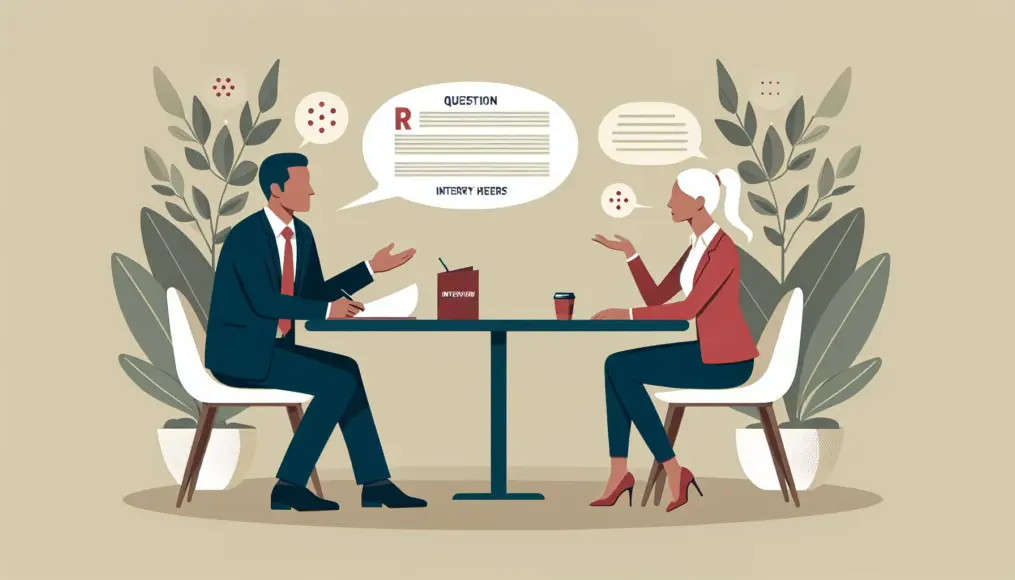Asking questions at the end of an interview isn’t just a formality; it’s a golden opportunity for candidates to deepen their understanding of the company and uncover the underlying truths about it. The specific questions you choose can significantly influence the impression you leave behind. In this article, we’ll explore the importance of asking questions during the final moments of an interview, suggest some effective questions to consider, and highlight what to avoid.
By asking the right questions, you can foster smoother communication with the interviewer and gather valuable insights about the company culture and potential career paths. This final interaction can also prompt you to reflect on how you might grow within the company. Use this article as a guide to prepare impactful questions that will set you apart at the end of your interview.
- Understand the significance and impact of questions during interviews
- Discover recommended questions and the intentions behind them
- Identify questions to avoid to prevent missteps
The Importance of Asking Questions at the End of an Interview
Asking questions at the end of an interview is a crucial moment for candidates. It provides a valuable opportunity to understand the company’s expectations and culture. On the flip side, failing to ask the right questions could leave a lackluster impression on the interviewer. Therefore, it’s essential to know how your final questions can be beneficial.
By asking questions, not only can you gauge the company’s mindset, but you can also showcase your own interests and career aspirations. In this section, we will explore how to delve into the company’s perspective and why asking questions is vital.
Delving into the Company’s Mindset
Asking questions at the end of the interview can give you insight into the company’s true thoughts and expectations. For instance, by inquiring about the type of candidates the company is looking for or its future vision, you can assess how well you fit within the organization. Additionally, understanding the interviewer’s values can facilitate smoother communication in the future.
Moreover, questions related to the company culture and work style can also be effective. This helps candidates determine whether they can envision a long-term career with the company. Through your questions, you can gain a deeper understanding of the organization from the inside out.
- An opportunity to learn about the interviewer’s expectations and company culture
- Gain insights to assess your fit within the organization
- Facilitate smoother future communications
The Importance of Questions
Asking questions at the end of an interview is not just a formality. Thoughtful questions can demonstrate your enthusiasm and interest, leaving a positive impression on the interviewer. Specifically, preparing specific questions can highlight your level of preparedness and seriousness.
Furthermore, questions can create a dynamic in the interview, transitioning it into a more natural conversation. This way, the interview becomes a two-way dialogue rather than a one-sided exchange. You might even leave the interview feeling more excited about the prospect of working for that company.
For those looking to deepen their understanding of the significance of asking questions during an interview, check out this article: “Techniques for Effective Reverse Questions to Stand Out in Your Final Interview”. This article discusses how reverse questions can enhance your impression and provides examples of effective questions. It’s packed with tips to further boost your chances of interview success, so be sure to take a look!
- A means to demonstrate enthusiasm and interest
- An opportunity to showcase your level of preparation
- Encourages two-way communication
Recommended Questions and Their Intentions
The questions you ask at the end of a job interview are crucial tools for understanding both your career trajectory and the company’s culture. By preparing specific questions, you can convey your interests and values to the interviewer while gaining insights into the company’s atmosphere and working style. In this section, we will introduce two particularly recommended questions and explain the intentions behind each.
Questions About Career Path
Inquiring about the career path is essential for applicants to consider how they can grow within the company. This question allows you to gather concrete information about the company’s career support and promotion opportunities. For instance, asking, “What does the career path look like for this position?” can help you envision your future within the organization.
Moreover, questions about career paths provide an opportunity to understand the company’s growth environment and its approach to talent development. This understanding can clarify what it means for you to work at that company.
- Learn about the company’s career support
- Confirm promotion opportunities
- Aid in envisioning your future
Questions to Understand Company Culture
Questions about company culture are vital for applicants to assess whether they would fit within the organization. For example, asking, “What is the team atmosphere like at your company?” can provide specific insights into daily operations and the work environment. Such questions allow you to determine if your values and work style align with those of the company.
Additionally, asking about company culture is a great way to demonstrate your interest to the interviewer. Understanding the company’s values and direction can lead you to consider how you might contribute to the organization.
If you’re interested in this topic, we also recommend checking out this article on effective techniques for asking questions during interviews: “Techniques for Making a Good Impression with Reverse Questions in First Interviews!”. This resource can help you leave a positive impression on the interviewer and further showcase your strengths.
- Discover the work environment and team dynamics
- Assess the alignment of your values
- Gain insights into the company’s direction and consider how you can contribute
Questions to Avoid in an Interview
The questions you ask at the end of an interview can significantly shape the impression you leave behind. However, if you don’t choose your questions wisely, you risk coming off negatively. Some questions can offend the interviewer or come across as misaligned with the company’s culture. In this section, we will highlight examples of questions to avoid during an interview and explain the potential impact of each.
The nature of your questions can lead the interviewer to doubt your seriousness or values. Therefore, it’s crucial to be careful when selecting questions to ask during your interview. By understanding which questions can create a negative impression or be uncomfortable to answer, you can foster better communication.
Questions That Leave a Negative Impression
One of the most common types of questions that can leave a negative impression is related to salary and benefits. For instance, if you bluntly ask, “How much does this company pay?” it may give the impression that you’re only interested in compensation. Additionally, inquiring about the company’s weaknesses or reasons for employee turnover should also be avoided. Such questions can prompt the interviewer to wonder, “Does this person really care about us?”
Moreover, questions that compare your potential employer to others should be approached with caution. Asking something like, “Another company has offered better terms; can you match that?” can come off as confrontational, which is certainly not the impression you want to make. These types of inquiries can undermine your perceived seriousness as a candidate.
- Avoid questions about salary and benefits
- Don’t ask about the company’s weaknesses or reasons for turnover
- Steer clear of comparisons with other companies
Questions That Are Difficult to Answer
You should also avoid questions that may be difficult for the interviewer to answer. For example, asking, “What challenges will your company face in the future?” can put the interviewer in an uncomfortable position. Such inquiries might raise concerns about the company’s future, which is not likely to be received favorably.
Additionally, a question like, “What is the turnover rate at this workplace?” should be avoided as well. It can come across as digging into past issues, making it an uncomfortable question for the interviewer. When questions are hard to answer, they can tarnish your impression as a candidate, so it’s essential to tread carefully.
- Avoid questions that are difficult for the interviewer to answer
- Don’t inquire about the company’s future challenges
- Refrain from asking about turnover rates
How to Enhance Your Impression Through Questions
The questions you ask during an interview can significantly influence the impression you leave on your interviewer. By posing thoughtful questions, you can demonstrate your enthusiasm and interest, thereby making a positive impact. Additionally, asking questions helps to ease the atmosphere of the interview, fostering more natural communication. In this section, we’ll delve into how to prepare and practice your questions and create a smooth conversational flow.
With solid preparation, you can approach your questions with confidence, leading to a more fluid dialogue with the interviewer. It’s crucial to brainstorm specific questions ahead of time and practice them aloud.
Preparing and Practicing Your Questions
Effective questioning requires thorough preparation. Start by listing what you want to know or any concerns you may have, and then develop specific questions based on your list. For instance, having a few questions ready about company culture or career progression can be very beneficial.
Moreover, practicing your prepared questions out loud is essential. Speaking them will help you refine your phrasing and tone, making it easier to ask them naturally during the interview. Practicing with friends or family can make this process even more effective.
- List your questions in advance
- Think of specific questions to ask
- Practice them out loud
Creating a Natural Flow of Conversation
In an interview, it’s important to create a natural flow of conversation through your questions. After you ask a question, show genuine interest in the interviewer’s response. For example, adding a comment like “That’s really interesting!” can help keep the conversation moving smoothly.
Additionally, try to connect your questions to the interviewer’s experiences or opinions. This approach can lead to deeper discussions. By gaining a better understanding of the company through your questions and integrating your own thoughts into the conversation, you can leave a lasting positive impression.
- Show interest in the interviewer’s responses
- Add comments to facilitate a smooth conversation
- Incorporate your own opinions into the dialogue
Summary
The questions you ask at the end of an interview can significantly influence the interviewer’s impression of you. By preparing thoughtful questions, you can demonstrate your genuine interest and enthusiasm while also gaining valuable insights into the company’s expectations and culture. In this article, we explored the importance of asking questions, provided specific examples of effective questions, and highlighted some to avoid. Leveraging this knowledge can help you navigate your interview more effectively.
Moreover, creating a natural flow of conversation through your questions is crucial for deepening communication with the interviewer. Don’t forget to prepare and practice ahead of time so you can confidently showcase your strengths during the interview. Ultimately, the questions you pose at the end can be a major stepping stone toward your success.
- The questions you ask at the end of the interview can shape impressions.
- Preparing the right questions enhances your understanding of the company.
- Creating a natural conversational flow is essential.
Interviews can be nerve-wracking, but with proper preparation, you can approach them with confidence. I sincerely wish you the best of luck in your interviews, and I encourage you to share your thoughts or questions in the comments!



Comment